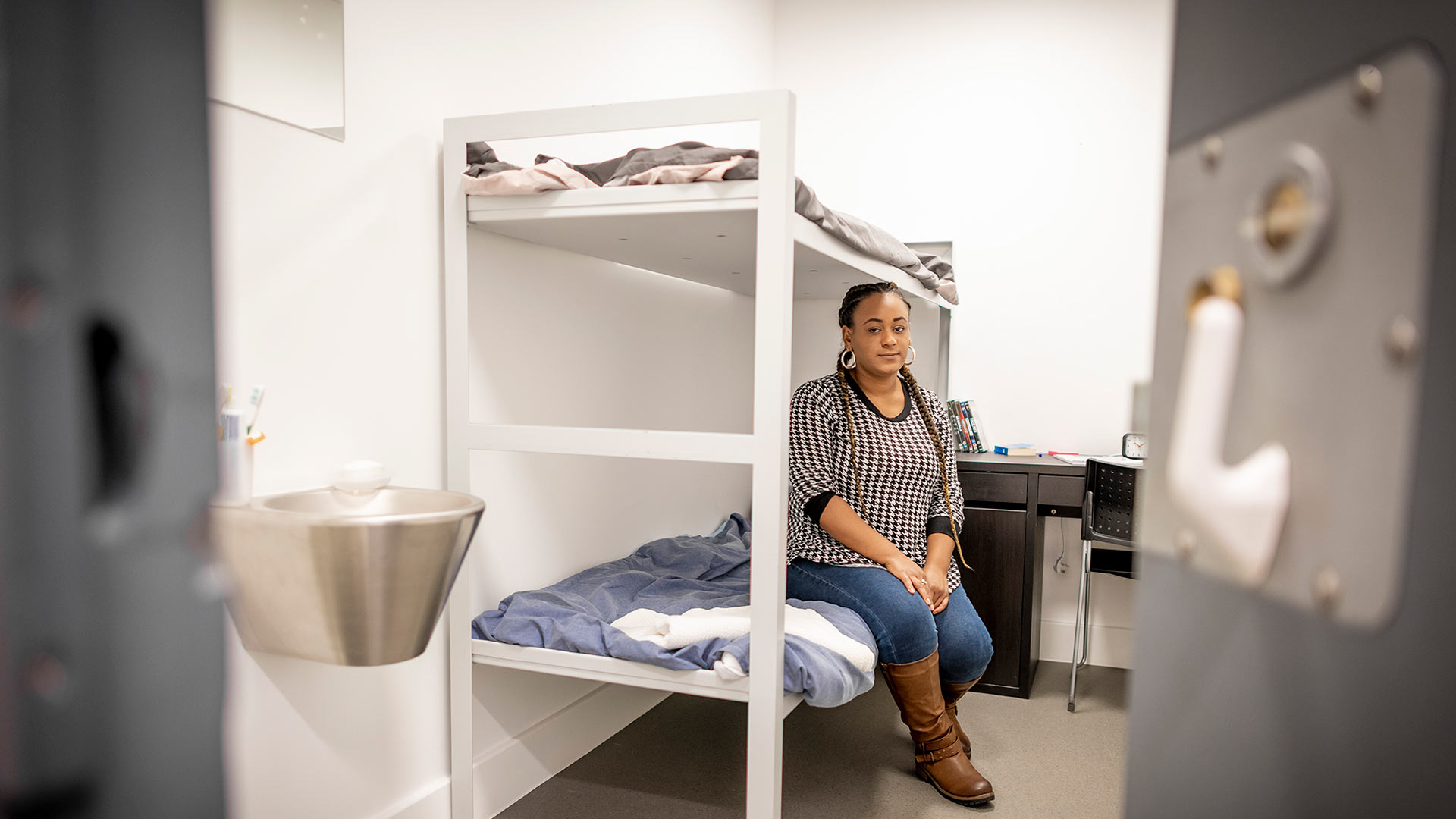Search
Forensic Psychology and Mental Health MSc
Study level: Postgraduate
Accredited by the British Psychological Society (BPS), this course is designed for those pursuing careers in forensic mental health, the criminal justice system or working towards Chartered Forensic Psychologist status with the BPS.
Year of entry
2025-26
Location
Coventry University (Coventry)
Study mode
Full-time
Duration
1 year full-time
Course code
CAST032
Start date
September 2025
November 2025
January 2026
March 2026
May 2026
July 2026
Course overview
This course provides an in-depth exploration of forensic psychology and mental health. Examine the cultural, gender and sexual contexts that shape forensic settings, and equip yourself with practical skills in risk assessment, case formulation and ethical practice.
- Bespoke curriculum: gain a comprehensive understanding of mental health disorders, case formulation, professional practice, risk assessment and management, research methodologies, legal frameworks and the criminal justice system.
- Applied learning: engage in critical discussions and immersive learning experiences, using real-world case studies and practitioner-informed scenarios to navigate the complexities of forensic mental health. Develop the skills and knowledge required to work with offenders facing mental health challenges in a range of forensic settings.
- Real world issues: explore contemporary challenges in forensic psychology through cutting-edge research methodologies and professional ethical practices. Gain hands-on experience in applied skills essential for working in forensic mental health settings.
5 QS Stars for Teaching and Facilities
QS Stars University RatingsRanked 9th Modern University in UK by the Times
The Times and Sunday Times Good University Guide 2025Ranked 8th for Overall Satisfaction in PTES
Postgraduate Taught Experience Survey (PTES) 2024Why you should study this course
- Career ready: prepare for a career in forensic settings with direct access to complex mental health environments, supported by academic staff and practitioners actively working with forensic populations. (Staff are subject to change.)
- Career-focused assessment: demonstrate your skills and knowledge through wide-ranging assessment methods designed to reflect real-world forensic practice, including risk assessments and case formulations.
- Facilities: enhance your learning with modern technology and simulations, gaining hands-on experience in realistic forensic environments such as simulated houses, prison cells, a hyper studio and virtual reality headsets.4
- Opportunities: boost your employability by applying for voluntary roles and placements in forensic settings, facilitated through external collaborations with His Majesty’s Prisons and Probation Service (HMPPS) and charities supporting individuals with criminal convictions.2
- Learning support: benefit from student-led, interactive teaching resources such as case studies, Padlet and Mentimeter.4 Gain direct access to a range of professional services, including employability and career progression, student wellbeing services and support from academic staff.
Accreditation and professional recognition

The British Psychological Society
This course is currently accredited by the British Psychological Society (BPS). If any changes occur with respect to our accreditation, we will seek to notify applicants and students as soon as possible.
This course is designed to fulfil Stage 1 requirements for becoming a Chartered Psychologist, provided you also possess the required Graduate Basis for Chartership. To be eligible for Chartership, you must also have an accredited undergraduate psychology degree or have completed an accredited conversion course before starting this MSc. For complete details, please visit the BPS website.
Collaborations
Endorsement by the Royal Society for Arts, Manufactures and Commerce (RSA)
Coventry University and the RSA have collaborated on a module related to social and ethical responsibility. You will be entitled to a 12-month fellowship of the RSA so you can access all RSA resources and platforms during your period of study. Once you have successfully passed the Project Planning and Ethics module, you will receive an RSA digital badge.
What you'll study
Study key areas of forensic psychology and mental health, gaining practical skills in case formulation, risk assessment and reintegration. Develop expertise in ethical practice, research methods, and intervention strategies for diverse populations. Explore offending behaviour and mental health disorders within the criminal justice system, while conducting an independent research project to apply your knowledge in real-world contexts.
We regularly review our course content, to make it relevant and current for the benefit of our students. For these reasons, course modules may be updated.
How you'll learn
Teaching and learning methods may include:
- lectures
- seminars
- tutorials
- workshops.
Teaching contact hours
As a full-time postgraduate student, you will study modules totalling 180 credits each academic year. A typical 30-credit module requires a total of 300 hours of study. Study hours are made up of teaching contact hours, and guided and independent study.
Teaching hours
Teaching hours may vary, depending on where you are in your studies, but on average you will have between 8 and 12 teaching and learning hours each week. You will also have the opportunity to attend optional sessions including time with a Success Coach or to meet with staff for advice and feedback.
Guided and independent study
Throughout your studies, you will be expected to spend time in guided and independent study to make up the required study hours per module. You will be digging deeper into topics, reviewing what you’ve learnt and completing assignments. This can be completed around your personal commitments. As you progress to the end of your studies, you’ll spend more time on independent learning.
Online learning
As an innovative university, we use different teaching methods, including online tools and emerging technologies. So, some of your teaching hours and assessments may be delivered online.
Assessment
This course will be assessed using a variety of methods which could vary depending on the module. Assessment methods may include:
- portfolios
- risk assessment
- case formulations
- written documentation.
The Coventry University assessment strategy aims to ensure that our courses are fairly assessed and allows us to monitor student progression towards achieving the intended learning outcomes.
Entry requirements
Typical entry requirements:
Fees and funding
| Student | Full-time | Part-time |
|---|---|---|
| UK, Ireland*, Channel Islands or Isle of Man | £9,350 | Not available |
| EU | £9,350 per year with EU Support Bursary** £18,600 per year without EU Support Bursary** |
Not available |
| International | £18,600 | Not available |
For advice and guidance on tuition fees3 and student loans visit our Postgraduate Finance page and see the university's Tuition Fee and Refund Terms and Conditions.
We offer a range of international scholarships to students all over the world. For more information, visit our International Scholarships page.
Tuition fees cover the cost of your teaching, assessments, facilities and support services. There may be additional costs not covered by this fee such as accommodation and living costs, recommended reading books, stationery, printing and re-assessments should you need them.
The following are additional costs not included in the tuition fees:
- Any optional overseas field trips or visits: £400+ per trip.
- Any costs associated with securing, attending or completing a placement (whether in the UK or abroad).
*Irish student fees
The rights of Irish residents to study in the UK are preserved under the Common Travel Area arrangement. If you are an Irish student and meet the residency criteria, you can study in England, pay the same level of tuition fees as English students and utilise the Tuition Fee Loan.
**EU Support Bursary
Following the UK's exit from the European Union, we are offering financial support to all eligible EU students who wish to study an undergraduate or a postgraduate degree with us full-time. This bursary will be used to offset the cost of your tuition fees to bring them in line with that of UK students. Students studying a degree with a foundation year with us are not eligible for the bursary.
Facilities
This course will take place at our Coventry University main campus. You will have access to innovative classrooms and facilities which include:
- Observation suite and recording/control room
Observe behaviours, interactions or experiments in a controlled environment without directly influencing the subjects, gaining valuable hands-on experience in psychological research methods. - Prison cells
Two furnished cells, one simulating a prison cell, and one simulating a custody cell, allow you to role-play real-life situations and put yourself in the shoes of prisoners and prison/police staff. Prisoner artwork is also on display. - Psychology lab
A suite of rooms with experimental equipment, such as eye tracking and EEG (electroencephalogram) resources, to support neuro-psychological, physiological and biological psychological research for undergraduate and postgraduate students.

Lanchester Library
The library is usually open 24/7, in term-time. It’s where you can access your course’s specialist Academic Liaison Librarian. It’s also home to specialist teams which can support you with your academic writing and maths and statistics questions.

The Hub
The Hub is the centre of student life on campus. Facilities include a food court, convenience store, multi-faith centre, medical centre, hairdresser, coffee shops and the Your SU offices. It has fully licensed function spaces and a bar.

Careers and employability
Get one-on-one career and employability guidance lasting up to 36 months from the end of your course. We’ll help you find placements and graduate roles, offer CV and application checks, mentoring, skills workshops, employer events and more.
Facilities are subject to availability. Access to some facilities (including some teaching and learning spaces) may vary from those advertised and/or may have reduced availability or restrictions where the university is following public authority guidance, decisions or orders.
Careers and opportunities
Our BPS-accredited Forensic Psychology and Mental Health MSc course equips successful graduates with both theoretical knowledge and practical expertise in forensic psychology, mental health and the criminal justice system. The course fosters ethical development and serves as a gateway to a rewarding career in forensic psychology.
On successful completion of Stage 1, you may be eligible to progress to Stage 2 training and pursue Chartered Forensic Psychologist status. Beyond forensic psychology practice, you should gain valuable skills for roles within the criminal justice system, including opportunities in the prison service (prison education staff, prison or police officer, key worker, probation officer, youth offending team), law enforcement and security services (MI5, MI6), and academia and research.
Potential roles, development opportunities and work settings include:
- assistant psychologist
- support worker in secure settings
- trainee practitioner
- interventions facilitator
- forensic psychologist in prisons
- appropriate adult during police interviews and providing statements
- outreach specialist engaged with individuals with mental health illnesses,
- forensic psychologist working in a therapeutic setting (such as with children in care
- multiagency worker.
Where our graduates work
Completion of BPS Stage 1 and successful course completion have led to graduate roles including:
- further Higher Education to complete BPS Stage 2 training in Forensic Psychology
- HM Prison Service
- Ministry of Justice
- Secure mental hospitals
- Victim support charities
- Clinical doctorate programmes
- Prison Custody Officer
- Therapy Assistant
- PGDip Forensic Psychology Practice
- Domestic Abuse Worker
- Psychological Wellbeing Practitioner
- Interventions Facilitator
- Forensic Psychologist in Training/Trainee Forensic Psychologist
- Qualification in Forensic Psychology (Stage 2).
How to apply
You may also like

Psychology MSc






